It’s been a busy NBA offseason for Derrick Rose, who was traded from the Chicago Bulls to the New York Knicks in June. And while his big-talking press conferences have captured most of the attention, what’s transpiring away from the public eye is far more important.
On August 26, 2015, Jane Doe filed a civil suit against Rose and two of his closest friends, Randall Hampton and Ryan Allen. The suit alleges that two years prior in Los Angeles, California, the three men drugged her at a party, then hours later in the early morning of August 27, 2013, trespassed into her apartment and proceeded to gang rape her while she was unconscious.
The case — which has generated TMZ headlines such as “Derrick Rose Accuser Consented to Group Sex… Mad Over Sex Toy” — goes to trial on October 4.

In June, Rose filed a Motion for Summary Judgment alleging that the case should be thrown out. The motion was denied because the judge concluded there was still “a genuine dispute of material fact as to the central issue in this action: whether Plaintiff consented to sexual intercourse with Defendants in early morning of August 27, 2013.”
While interest in the case has been picking up over the past few weeks, it has been largely ignored over the past year, to the point that in a memorandum filed on August 22 arguing for Jane Doe’s pseudonym to be precluded at trial, Rose’s lawyers wrote that they “do not think any media restrictions are warranted or necessary, partly because the media has to some degree lost interest in the case.”
But Rose’s case demands attention. In the past few months, as the two sides have prepared for trial, it has become readily apparent that the case shares dangerous commonalities with other high-profile cases of sexual assault by famous athletes.
By repeatedly fighting to publicly reveal Jane Doe’s name, presenting her as sexually adventurous and aggressive, and glossing over the issue of consent, Rose’s defense has focused more on smearing the victim than proving its client’s innocence.
The Battle Over The ‘Jane Doe’ Pseudonym
Rose’s attorneys want the alleged victim’s name to be a matter of public record and used freely in the upcoming trial.
Currently, Doe’s attorneys are offering a compromise, saying that the alleged victim’s real name can be used in the trial, but that access to the courtroom will be limited and the media will still be required to use “Jane Doe.”
Rose’s lawyers have not agreed to the compromise. These are their feelings on the issue, from a memorandum filed on August 22:
This is not a rape case. It’s pure and simple extortion by a plaintiff who wants to hide behind the cloak of anonymity while seeking millions in damages from a celebrity with whom she was in a long-term nonexclusive consensual sexual relationship.
Before we go any farther, let’s revisit what we know about the case so far: Rose and Doe met at a club in 2011 during the NBA lockout, and began a non-exclusive relationship which lasted two years.
On August 26, 2013, Rose invited Doe and her friend, Jessica Groff, to his rental house in Beverly Hills. Rose sent a car to pick up Doe and her friend, but the car went to the wrong location and ended up being three hours late. While they were waiting, Doe and Groff drank vodka, and once in the car, Doe drank an individual serving of wine. They drank tequila upon arriving at Rose’s residence.
“No matter how Plaintiff chooses to depict her sexuality on social media, her allegations of rape entitle her to the protections of anonymity.”
The parties disagree over whether consensual sex occurred at the party that night. But after a few hours, Groff and Doe went home in a cab. Doe and Rose continued texting. She wanted him to come over alone, while he wanted to send his friends to come get her and bring her back to his house. She eventually fell asleep, and around 2 a.m., Rose, Hampton, and Allen arrived at her apartment and spent about 30 minutes trying to wake her up to get her to let them in. There is a dispute over whether she eventually woke up and let them in or whether they found another way to get up to her apartment.
Once they arrived at her apartment, the three men proceeded to have intercourse with her. They all claim it was consensual, but Doe denies even being awake for the encounter.
So, here we are. The reason a pseudonym is permitted in high-profile cases such as this is because of the abuse an alleged victim can suffer when her name becomes public, as was highly evident in the Kobe Bryant rape case 13 years ago.
But from the outset, Rose has maintained Doe does not have this right to privacy. In June, his attorneys argued that a pseudonym should be excluded from pre-trial proceedings. One of the reasons? Doe had posted “sexually suggestive” pictures on Instagram.
Of special note, Plaintiff is publicly portraying herself as sexual. The production includes photos from Plaintiff’s Instagram account that are sexual in nature. In these images, Plaintiff is dressed in provocative attire, is in sexually suggestive poses, and is in photographs indicating that she engages in sexually charged encounters with more than one man at a time. Plaintiff’s use of twitter and other forms of social media further belies her apparent desire for anonymity.
At the end of the day, the use of “Jane Doe” for all pre-trial activities was upheld, although the judge did permit the defense to use Doe’s real name when needed for discovery.
The judge was not amused by Rose’s arguments:
The Court is uncertain what to make of this reasoning. Defendant Rose appears to suggest that women who publicly portray themselves as “sexual” are less likely to experience embarrassment, humiliation, and harassment associated with gang rape. Such rhetoric has no place in this Court. No matter how Plaintiff chooses to depict her sexuality on social media, her allegations of rape entitle her to the protections of anonymity.
Doe’s lawyers continue to argue that a pseudonym is crucial to the alleged victim’s safety.
“Public disclosure of Plaintiff’s name and likeness does not serve any legitimate purpose but rather only serves Defendants’ attempts to intimidate and harass Plaintiff and to have a plausible deniability defense if third parties engage in harassment, intimidation, or worse,” they said in a memorandum filed on August 29.
The Slut-Shaming Defense
In multiple court briefings, Rose’s legal team describes Doe as “sexually adventurous,” and as the “sexual aggressor” the night in question.
Of course, being sexually adventurous has no bearing on whether or not a person can be raped. And in this particular case, it also seems like a mischaracterization of Doe.
In particular, they focus on the fact that she “volunteered to bring a sex belt to have fun with Mr. Rose” on August 26. While it is true that Doe mentioned a sex belt, Rose said himself in the deposition that he told her to get the belt.
Q: You told her to get [the sex belt]? Is that what you said?
Rose: Yeah.
Q: Okay. And did she ask you to pay her money for buying it?
Rose: I kind of assumed myself that I was going to look out for her for her just getting it anyway, but I think it was — we both understood that I was going to give her something for the belt.
Furthermore, Rose revealed in his deposition that throughout the course of their relationship, he had pressured her to send him sexual videos, but she never did. At one point, he even bought Doe a MacBook specifically so that she could “masturbate on Skype.”
But Doe says in her deposition that she “could not get comfortable” doing this, and only was able to strip down to her bra and panties.
“I tried to like, reveal myself and — but it was — he was annoyed by it,” she said. “He was annoyed that I wasn’t doing it right.”
While there are multiple texts proving that Rose repeatedly asked for videos from Doe, she denies ever sending any, and Rose has not produced any in discovery.
Defendant Rose to Plaintiff: “I can’t wait to get my pussy”(06/20/2013 01:06:35 PM)Defendant Rose to Plaintiff: “Send a video”(06/20/2013 01:31:48 PM)Defendant Rose to Plaintiff: “Send a video”(06/20/2013 01:32:56 PM)Defendant Rose to Plaintiff: “I want to see her cumin”(06/20/2013 01:38:08 PM)Defendant Rose to Plaintiff: “Let me know when u send it”(06/20/2013 01:43:21 PM)Defendant Rose to Plaintiff: “Was u able to send it”(06/20/2013 02:41:39 PM)
After Rose and Doe had been dating for a year-and-a-half, Rose began to request she join him in group sex. But according to Rose’s own deposition, prior to the night of the alleged rape, she always refused.
In fact, Rose called off the relationship with Doe earlier that summer after she refused to engage in a foursome with Rose, Randall Hampton, and Hampton’s girlfriend.
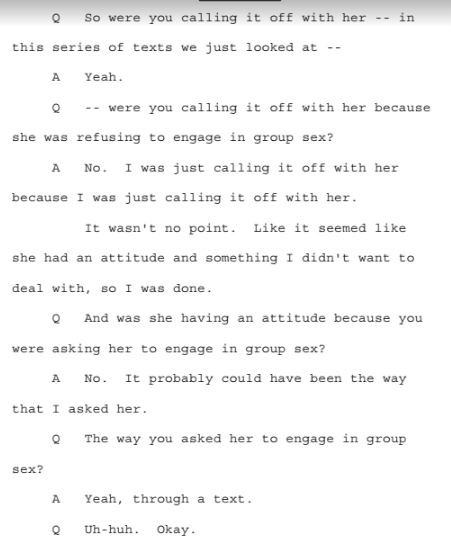
Also in June 2013, Rose asked Doe to bring a friend along with her to visit him. She did, but as he clearly states, the two did not consent to group sex.
Rose: Oh, I wanted her to bring a friend for a threesome.
Q: And did she?
Rose: No. I mean, she brought her yeah.
Q: And did you try to have a threesome with her?
Rose: I don’t think it played out that way.
No, I didn’t try.
Q: [Plaintiff] wouldn’t consent to any sort of sexual activity with [her friend]; isn’t that right?
Rose: Yeah.
Later in the deposition, Rose flat-out denies ever having group sex with Doe, because every time he pushed the issue, she would refuse.
Q: Have you ever had a threesome or a foursome with [Plaintiff]?
Rose: No.
…
Q: All the other times that you pushed that issue with her, she refused; isn’t that right?
…
Rose: Yeah
The Real Issue: Consent
Ultimately, this is a rape case, and therefore it all comes down to whether or not Doe consented to group sex, whether or not she was even sober enough to consent to group sex, and if she wasn’t sober enough, whether or not Rose and the other defendants were aware of that.
As to Doe’s level of inebriation on the morning in question, Rose’s own expert toxicologist estimated she had a BAC level of 0.20, which is 2.5 times the legal driving limit.
“I said we men. You can assume. Like we leaving to go over to someone’s house at 1:00, there’s nothing to talk about.”
Jessica Groff, Doe’s friend who was at Rose’s party with her, said in her deposition that it was “very obvious” Doe was intoxicated. In fact, Doe even burned her hand after she picked up rocks in the fire pit for “no rational reason.”
After Groff allegedly had a fight with Allen that night, she decided to leave the party. However, she refused to leave Doe alone at the house.
“I knew [Doe] was very intoxicated,” Groff said in her deposition. “I definitely was not going to leave her there alone. I did not feel safe and did not believe [Doe] would be safe if left alone.”
So Groff and Doe got a cab, and Groff dropped Doe off at her apartment.
Later that night, Rose inquired about whether Doe got home safely, and the two began conversing again through text message. Rose wanted to send someone to pick up Doe and return her to his house, but she wanted Rose to come to her apartment, alone.
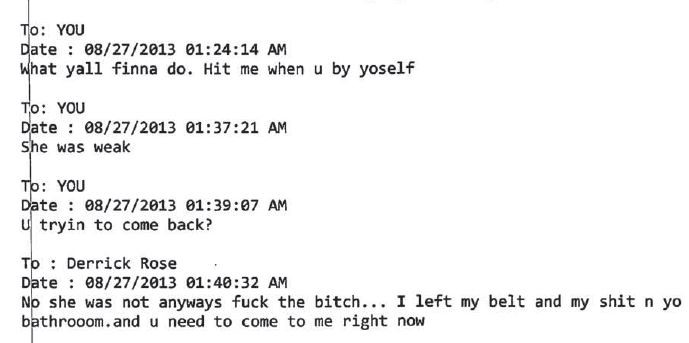
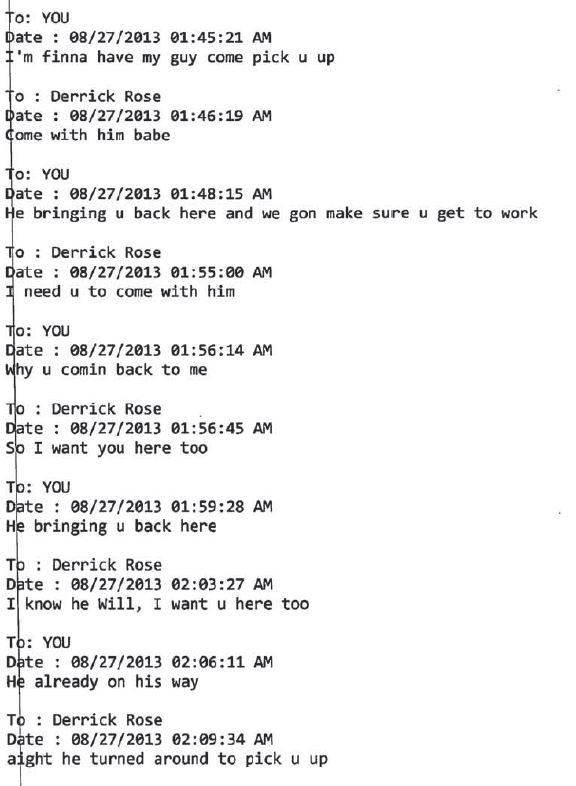
Eventually, Rose arrived at Doe’s apartment with Allen and Hampton. She stopped responding to texts well before they arrived, as was revealed in the Plaintiff’s Opposition to Defendant Rose’s Motion to Preclude Use of Pseudonym at Trial, filed on August 29:
The evidence shows that Plaintiff was unconscious when Defendants arrived to her apartment in the early morning hours of August 27, 2013, and that she did not respond to texts or calls from Defendants Rose and Allen:
2:05 AM Call from Defendant Allen to Plaintiff Unanswered
2:12 AM Call from Defendant Allen to Plaintiff Unanswered
2:27 AM Text from Defendant Rose to Plaintiff “Hello?”
2:29 AM Call from Defendant Allen to Plaintiff Unanswered
2:49 AM Call from Defendant Allen to Plaintiff Unanswered
2:50 AM Text from Defendant Allen to Plaintiff “We outside”
2:50 AM Call from Defendant Allen to Plaintiff Unanswered
2:51 AM Call from Defendant Allen to Plaintiff Unanswered
2:52 AM Call from Defendant Allen to Plaintiff Unanswered
2:52 AM Text from Defendant Allen to Plaintiff “Wake yo ass up”
2:53 AM Call from Defendant Allen to Plaintiff Unanswered
In a deposition on June 17, Rose says that he didn’t talk with Allen and Hampton about the reason they were going to Doe’s apartment, but that the reason was understood because “we men.”
Q: Did either Mr. Hampton or Mr. Allen tell you why they wanted to go to Plaintiff’s home on the night in question?
Rose: No. No.
Q: So they just said, ‘Hey, it’s the middle of the night. Let’s go over to Plaintiff’s house’ and they never gave you a reason why they wanted to go over there?’
Rose: No, but we men. You can assume.
Q: I’m sorry?
Rose: I said we men. You can assume. Like we leaving to go over to someone’s house at 1:00, there’s nothing to talk about.
However, while the defense is using Doe’s texts inviting Rose over to her apartment that night as proof that she consented, Rose admitted in his deposition that nowhere in the text message did she consent or even mention group sex.
Q: All right. Is there — within what you just reviewed in those text messages, is there anything within them that would lead you to believe that plaintif wanted to have sex with you and the other two defendants on August 26th, 2013?
…
Rose: No.
The Aftermath
Doe said in her deposition that she woke up the next morning “fully dressed and wet with lubricant.” Her sheets were a mess and also filled with lubricant, and there was a used condom.
“I never had my apartment that way,” she said. “Like that would have never happened.”
She went to work that morning, and slowly began piecing together memories from the night of before, with an assist from Groff’s text messages and her roommate. It took her a few days to tell her roommate what had happened.
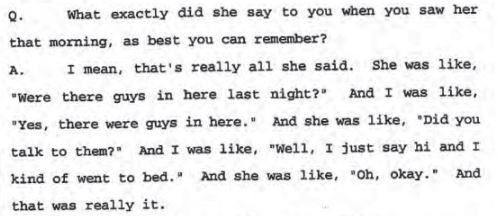
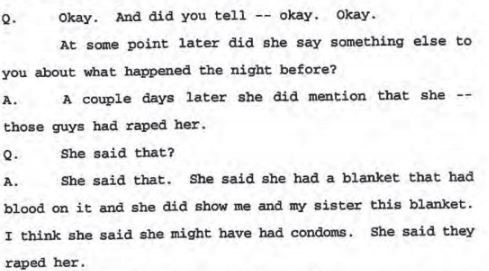
The morning of August 27, Doe reached out to Rose. She texted him about her hangover, and asked him to reimburse her for Groff’s cab fare from the night before and for the sex belt, which she admitted in her deposition that she lied to Rose about purchasing. She did not mention the alleged rape.
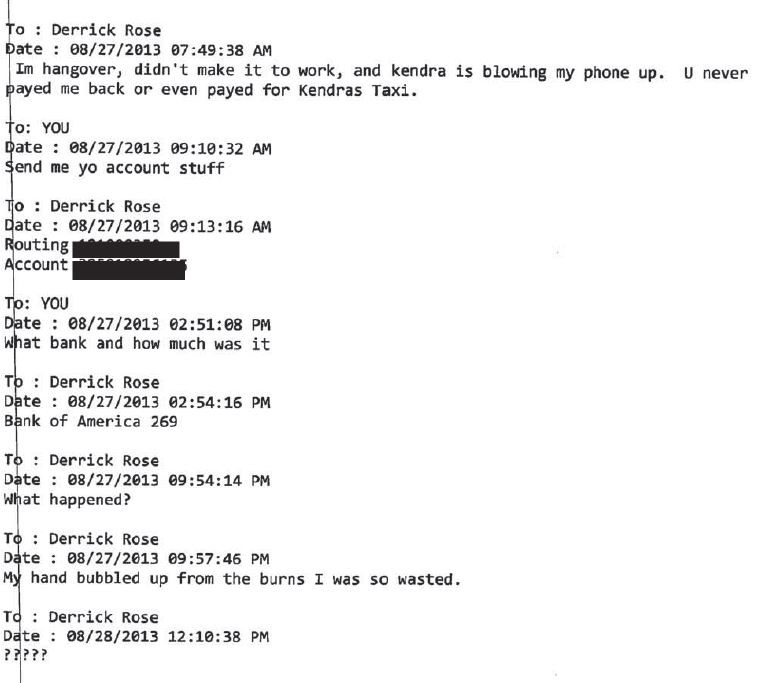
Rose’s lawyers say that this undermines “the validity of her allegations in this lawsuit.”
Jane Doe, meanwhile, said in her deposition that she didn’t really care that much about the money for the sex belt, it was just her way of reaching out to Rose. She wanted to talk to him about what happened that night.
“I didn’t want — I was just too — I was too prideful, and I felt — I didn’t want to mention anything that had happened. And that’s the way I felt like I could communicate with him without feeling like I was completely victimized,” Doe said.
She did get somewhat more direct with Rose (and Allen) in the coming days and weeks.
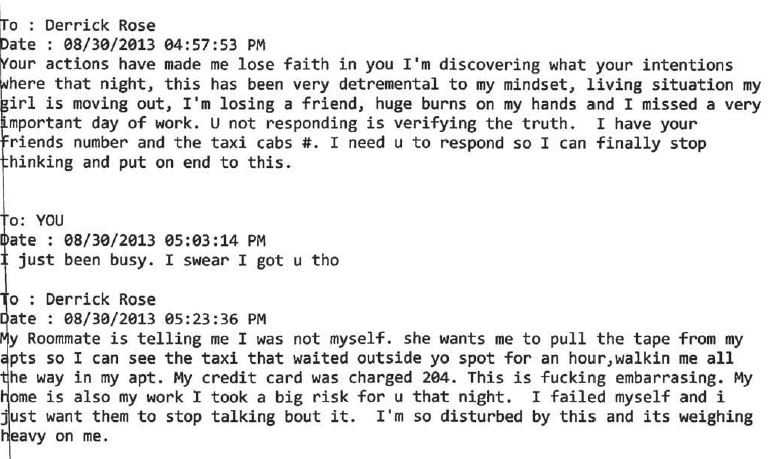

Rape cases are always uphill climbs for victims. According to RAINN, less than one percent of all rapists will ever spend a day in jail. Rape trials, which often boil at least partially down to he-said, she-said, are always damning for both parties, but particularly for the alleged victim when the accused rapist is a celebrity.
As ThinkProgress has previously reported, in a study of the media coverage of the Kobe Bryant rape case, Renae Franiuk, a professor of psychology at Aurora University, found that the media was incredibly guilty of perpetuating rape myths, such as “she’s lying,” “she asked for it,” or “she wanted it.”
Media and fans latch onto these narratives because they don’t want to believe that the player they root for, whether it’s Ben Roethlisberger or Greg Hardy, Jameis Winston or Patrick Kane, is capable of committing such a crime. That’s why flashy headlines such as “Derrick Rose Accuser Consented to Group Sex … Mad Over Sex Toy” can be so effective in shaping the public discourse about a case.
“These people believing these myths don’t want people to be sexually assaulted, and, ironically, that’s why they don’t believe the women,” Franiuk said. “It’s easier to believe the myths because you don’t want to believe that sexual assault is possible, but then that disbelief just makes the problem of sexual assault worse.”
Since the alleged assault, Doe allegedly “experiences severe anxiety and nervousness, tension, accompanied by worry and fear of being subjected to another traumatic sexually abusive experience.” She says the anxiety has impacted her physically — she pulls out her eyelashes and hair, twitches in public, scratches at her face, and is experiencing adult acne for the first time in her life.
Rose stated from the beginning that he was not going to let this case change his lifestyle, and that he was going to use it as “motivation.” The Knicks were his “first choice” for a trade. He is on the final year of his contract, and will earn $21.3 million this season.


